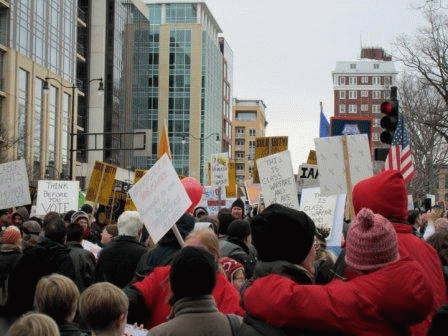The Recall Scott Walker efforts are into their second week and initial signs point to a great turnout for signature gathering and sustained enthusiasm needed to get this drive across the finish line by early January.
A major contributor to this effort will be organized labor. Remember, it was the Wisconsin Teaching Assistant union members who were the first to protest Gov. Walker's attempt at union busting. Without them, the movement may never have started. They were quickly followed with union solidarity from across the state. Anyone who witnessed first hand the marches in February and March in Madison will never forget the array of union members: plumbers, firefighters, teachers, laborers of every walk of life.
And labor played a significant role in the November 8 victory in Ohio to repeal Senate Bill 5. So who better than the Tim Burga, president of the Ohio AFL-CIO, to provide wisdom and encouragement to those in Wisconsin. We are pleased to print his letter of support:
A Message to the Working Men and Women of Wisconsin
from Ohio AFL-CIO President Tim Burga
Earlier this year, Ohioans watched our Wisconsin brothers and sisters in their inspired fight as they were the first to push back against an unprecedented attack on working families that would eventually play out in states across the country, including Ohio. When our fight began, we had inspiration from the example that Wisconsin set in responding to these right wing attacks. That set a momentum that lasted all the way through the year. We collected nearly 1.3 million signatures to get a referendum on the ballot. We ran a robust and sophisticated campaign that had an army of thousands of volunteers that spread our message with canvasses, phone calls and work site leaflets.
In the end, we were able to convince a vast majority of Ohio voters that Governor Kasich's attack on public employees was an attack on all middle class Ohioans. On November 8th, more Ohioans voted against Issue 2 than voted for Governor Kasich in the fall of 2010. We won 61-39%. We told Governor Kasich and all those who would pursue similar scapegoating strategies to think again. By attacking working families instead of solving the real problems that face our economy, this attack united middle class Ohioans like never before. And we sent a message. And now, Wisconsin, it's your turn once again.
As you begin your historic campaign to restore justice for the working people of Wisconsin, know that we here in Ohio stand with you. Initially, I would also like to share a few lessons we learned through our struggle.
First, 2010 didn't mean what some people might think. Challengers in the 2010 mid-term elections benefited from a formidable current for change, but the change voters wanted was a solution to the economy and the jobs crisis--not political maneuvers and overreach.
Across the board, voters in the Buckeye state said the anti-worker law "was not the kind of change Ohio was looking for in 2010," according to a post-election survey conducted by Hart Research for the AFL-CIO. Voters, in fact, are more leery than ever of partisan games. Ohio voters said they perceived the law as a political maneuver by Gov. Kasich and state Republicans to weaken labor unions (53%) rather than a genuine effort to make state government more efficient (33%).
Second, remember that 2011 is not 2010, and politics in 2012 will evolve even more. Give credit to the Occupy Wall Street movement (and historic inequality) for redefining the political narrative. Fifty-six percent of Ohio voters in the Hart survey agreed that Kasich and his allies "are putting the interests of big corporations ahead of average working people."
These attitudes are widely shared by the swing voters who supported President Obama in 2008 but elected Republican governors and U.S. representatives in 2010--and will decide the presidential and congressional elections in 2012. They're working Americans with modest incomes, moderate views and little patience for policies that aren't fair and don't work.
More than 26 percent of 2010 Kasich voters, in fact, were part of the overall 61 percent majority who rejected the limits on collective bargaining. This sea change was strongest among voters in the middle of the economic and ideological spectrums. Yes, public employees, union members, Democrats and liberals voted overwhelmingly against the controversial law. But they were joined by definitive majorities of voters from households with no public employee, workers without union representation and independents, as well as 30 percent of Republicans and 36 percent of conservatives.
Finally, know that working people joined together will win. Every. Single. Time. Firefighters, teachers and other public employees were joined by plumbers and pilots and all kinds of private-sector employees to win. Worker to worker, neighbor to neighbor, the message spread, and what began as an attempt to divide workers flopped famously. In the end, working people's solidarity was the message. I will never forget the solidarity I felt when so many of our Wisconsin brothers and sisters made the trip to Ohio to make our struggle their own. Their presence bolstered our own spirit and further drove our victory. The bratwurst and beer they brought with them sure helped too!
(Note: You can view every article as one long page if you sign up as an Advocate Member, or higher).






